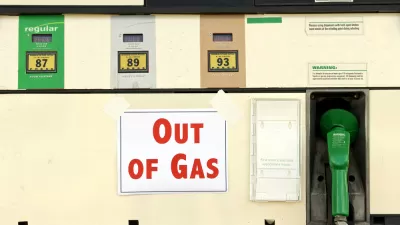Michael Sivak of the Univ. of Michigan has published another key report documenting our waning love affair with the automobile. Sivak documents peak overall gasoline consumption occurring in 2004. Per capita fuel consumption may have peaked in 2003.
Dr. Sivak of the University of Michigan Transportation Research Institute (UMTRI) looked at fuel consumption of light-duty vehicles in the U.S. from 2004-2011 and found that it fell 11 percent during that period. By no means was that the only aspect of auto use that has fallen in the last decade.
E&E reporter Julia Pyper writes that "(f)uel consumption rates per person, per licensed driver, per household and per registered vehicle fell even more sharply and are now below where they were in 1984. Each of these rates peaked in 2003 or 2004, ahead of the 2008 financial recession, and fell 13 to 17 percent by 2011."
Sivak suggests that these peaks in consumption rates will stand because they "occurred several years prior to the onset of the current economic downturn."
Pyper lists many of Sivak's reports which may also be found in the "related" links below.
The UMTRI report [PDF] is the latest report in a series of studies. Earlier research found that the overall number of registered light-duty vehicles in the United States peaked in 2008 and the number of registered vehicles on a per-capita basis peaked in 2006. Sivak also found the number of vehicle miles traveled peaked in 2004 and declined 5 to 9 percent per person, per licensed driver, per household and per registered vehicle by 2011 (ClimateWire, July 29). [ClimateWire is subscription - also see Planetizen, June 20, 2013]
As for the primary cause of the fuel consumption reduction, Sivak points to fuel efficiency, though a reduction in driving clearly contributed as well.
According to Sivak, the steeper drop in fuel consumption over the corresponding decrease in distance driven -- 13 to 17 percent versus 5 to 9 percent -- reflects an improvement in vehicle fuel efficiency.
While reduced fuel consumption is clearly good for reducing greenhouse gas emissions and dependence on imported oil, there is a downside, described by Deron Lovaas, federal transportation policy director for the Natural Resources Defense Council. "(I)t presents a problem for a transportation network that relies on the federal gasoline tax to fund upgrades and expansions," he said. "It turns out it intensifies the need to find a new solution for our transportation funding problem."
FULL STORY: Has the U.S. Passed Peak Gasoline?

Alabama: Trump Terminates Settlements for Black Communities Harmed By Raw Sewage
Trump deemed the landmark civil rights agreement “illegal DEI and environmental justice policy.”

Study: Maui’s Plan to Convert Vacation Rentals to Long-Term Housing Could Cause Nearly $1 Billion Economic Loss
The plan would reduce visitor accommodation by 25% resulting in 1,900 jobs lost.

Planetizen Federal Action Tracker
A weekly monitor of how Trump’s orders and actions are impacting planners and planning in America.

Wind Energy on the Rise Despite Federal Policy Reversal
The Trump administration is revoking federal support for renewable energy, but demand for new projects continues unabated.

Passengers Flock to Caltrain After Electrification
The new electric trains are running faster and more reliably, leading to strong ridership growth on the Bay Area rail system.

Texas Churches Rally Behind ‘Yes in God’s Back Yard’ Legislation
Religious leaders want the state to reduce zoning regulations to streamline leasing church-owned land to housing developers.
Urban Design for Planners 1: Software Tools
This six-course series explores essential urban design concepts using open source software and equips planners with the tools they need to participate fully in the urban design process.
Planning for Universal Design
Learn the tools for implementing Universal Design in planning regulations.
Caltrans
Smith Gee Studio
Institute for Housing and Urban Development Studies (IHS)
City of Grandview
Harvard GSD Executive Education
Toledo-Lucas County Plan Commissions
Salt Lake City
NYU Wagner Graduate School of Public Service



























